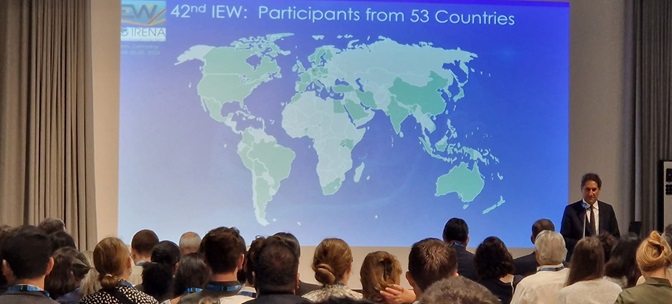

Bonn's 2024 International Energy Workshop Gave New Insights to Advance Global Energy Modelling
Newsletter
The 2024 edition of the International Energy Workshop (IEW) has concluded in Bonn, Germany last week, drawing energy modelling experts from across the globe. This year, the International Renewable Energy Agency (IRENA) hosted the event, which is regarded as a cornerstone for the international energy modelling research community.
Since its inception in 1981, the IEW has evolved into a prominent forum where analysts and thought leaders converge to compare quantitative energy projections, understand divergent views on future energy developments, and identify emerging trends in global energy production and consumption. The gathering aims to address the complexities of energy planning and policymaking amidst environmental and economic constraints.
Francesco La Camera, Director-General of IRENA, welcomed participants, emphasising the critical role of the conference in the global energy transition, “For IRENA, this conference is one of the Agency’s most important links to the scientific community; every year we look forward to the cutting-edge energy modelling work that is presented here. That work is more important now than ever. The historic call at COP 28 to triple renewable power generation capacity and double the rate of energy efficiency improvement by 2030 has set the stage for a rapid scaling up of renewables in the remainder of this decade.”

This year’s conference featured three plenary sessions with three key themes respectively, and over 140 presentations in parallel sessions. These include energy supply and price projections, energy savings and efficiency, renewable and innovative energy technologies, environmental and climate policy, and the intersection of energy analysis, economics, and the natural sciences.
The first plenary session saw experts from the European Centre for Medium-Range Weather Forecasts, Electric Power Research Institute, and United Nations Framework Convention on Climate Change examine latest insights into how climate change considerations can be included in today's models. “We need to go beyond the integrated assessment models that have dominated the Intergovernmental Panel on Climate Change (IPCC)’s assessments and look much more at models that apply to particular countries, particular regions and particular sectors,” said Professor Jim Skea, the Chair of IPCC, in his video remarks, echoing the day’s theme that focuses on a targeted approach to meet the Paris Agreement climate goals.
The second plenary on day two delved into the policy side of energy modelling. With her presentation, Dr. Sonia Yeh, Professor of Transport and Energy Systems at Chalmers University of Technology, Sweden, explored policy recommendations to advance the adoption of electric vehicles including grid management, robust charging infrastructure and big data to guide a sustainable transition in the transport sector.
Meanwhile, Prof. Dr. Bjarne Steffen from ETH Zurich, Switzerland, highlighted the role of public finance to catalyse private investments, and the importance of supporting policies to make renewables projects financially feasible. Finally, Dr. Gunnar Lederer gave the background of how robust energy modelling was able to play a pivotal role to support the development of the European Union’s latest climate target.
The third plenary session on the last day of the conference looked into data advances in energy modelling. Experts in this session shared insights on the latest advancements in data gathering for energy modelling, which include machine learning and artificial intelligence (AI). A presentation from Dr. David McCollum, Distinguished Scientist at the Oak Ridge National Laboratory, USA, highlighted the use of AI in optimising renewables deployment in the power grids.
Dr. Keigo Akimoto, Chief Researcher at the Research Institute of Innovative Technology for the Earth, Japan, further commented on the role of demand in the energy transitions, saying, “Energy demand is not usually the focus of modelling, but digitalisation, innovation, and behaviour change have the potential to reduce our energy and resource needs significantly in the energy transitions, and often at the lowest cost.”
The last day also saw IRENA’s outlook on the costs of renewable power generation. Highlighting the significant declines in costs of solar and wind technologies and the key drivers of the costs reduction, Michael Taylor, Head, Renewable Energy Costs and Outlook at IRENA, said, “What consistently surprises me is how remarkable the learning rates are for wind and particularly solar technology. And at a global level, these are actually accelerating.”
The 2024 IEW turned out to be a pivotal event, enriching the global energy modelling community with new ideas essential for navigating the challenges and opportunities in the energy sector. As the world grapples with the urgent need for sustainable energy solutions, the insights shared at the IEW will undoubtedly play a crucial role in shaping a sustainable and resilient future of the global energy system.




